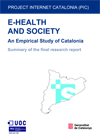 This study analyzed the interaction between organizational change, cultural values and technological change in the Catalan health system. The study is subdivided in five distinct parts. The first one is a content analysis of the webs related to health in Catalonia. The second is a study of the uses of Internet in health related issues among the population at large, the patients associations, and the health professionals, on the basis of an Internet survey adapted to each one of these groups. The third is a field work study of the experimental programs conducted by the Catalan government in several local areas and hospitals to integrate electronically the patients' clinical history. The fourth is a study of the organizational implications of the introduction of information systems in the management of hospitals and primary care centers in the Catalan Institute of Health, the major public health provider in Catalonia, on the basis of an Internet survey and in-depth interviewing. The fifth is a case study of the organizational and social effects of the introduction of information and communication technologies in one of the leading hospitals of Catalonia, the Clinic Hospital of Barcelona. The study was conducted between May 2005 and July 2007.
This study analyzed the interaction between organizational change, cultural values and technological change in the Catalan health system. The study is subdivided in five distinct parts. The first one is a content analysis of the webs related to health in Catalonia. The second is a study of the uses of Internet in health related issues among the population at large, the patients associations, and the health professionals, on the basis of an Internet survey adapted to each one of these groups. The third is a field work study of the experimental programs conducted by the Catalan government in several local areas and hospitals to integrate electronically the patients' clinical history. The fourth is a study of the organizational implications of the introduction of information systems in the management of hospitals and primary care centers in the Catalan Institute of Health, the major public health provider in Catalonia, on the basis of an Internet survey and in-depth interviewing. The fifth is a case study of the organizational and social effects of the introduction of information and communication technologies in one of the leading hospitals of Catalonia, the Clinic Hospital of Barcelona. The study was conducted between May 2005 and July 2007.
Research team
- Manuel Castells, professor at the UOC and director of the research project
- Francisco Lupiáñez, lecturer at the UOC
- Francesc Saigi, lecturer at the UOC
- Josefina Sánchez, senior researcher at the IN3
In collaboration with:
- Albert Fornieles, lecturer at the Autonomous University of Barcelona
- Anna Graells, research assistant
- Imma Grau, PhD student of the PhD programme at the UOC
- Carolina Jiménez, research assistant
- Salomé Larrea, lecturer at the Autonomous University of Barcelona
- Mireia Utzet, research assistant
With the support of:
Download E-Health and Society: An Empirical Study of Cataloni Report (.pdf, 201 KB)
Download from the eHealthNews.EU Portal's mirror: E-Health and Society: An Empirical Study of Catalonia (.pdf, 201 KB)
About Project Internet Catalonia (PIC)
The Project Internet Catalonia is an interdisciplinary research programme on the information society in Catalonia that has been carried out by researchers from the UOC's Internet Interdisciplinary Institute (IN3), with collaboration from a number of bodies and individuals in the surveying and documentation tasks. For further information, please visit http://in3.uoc.edu/.